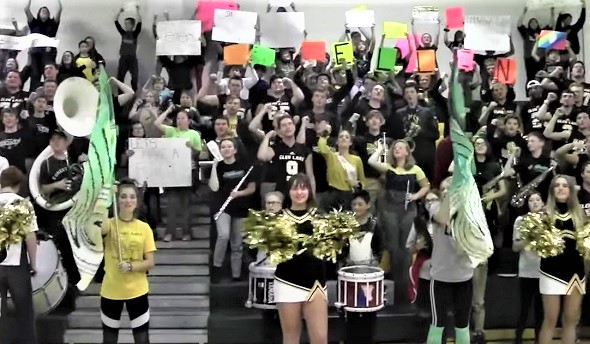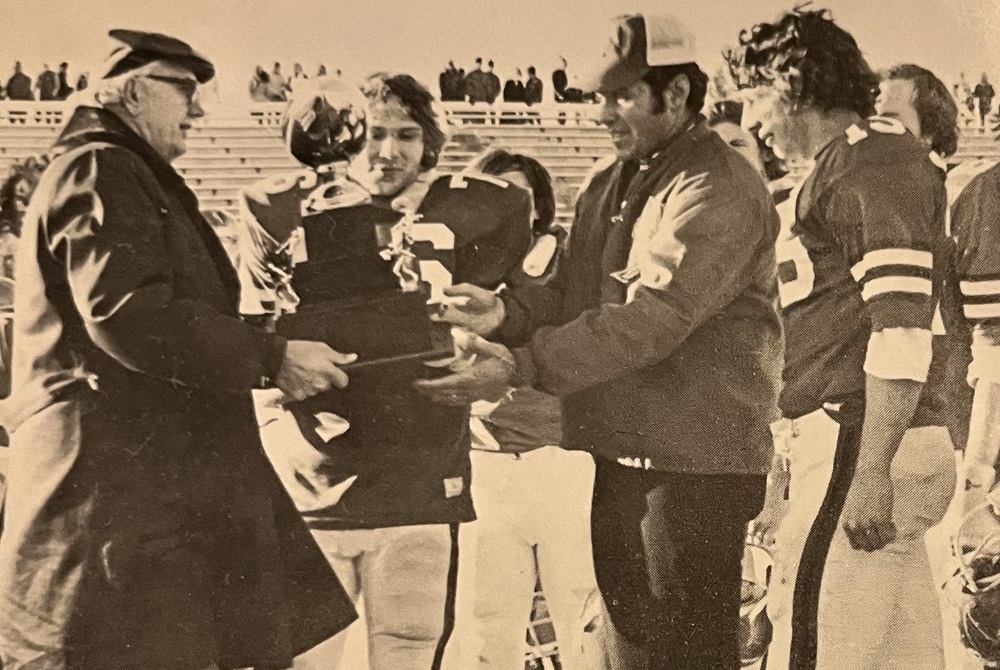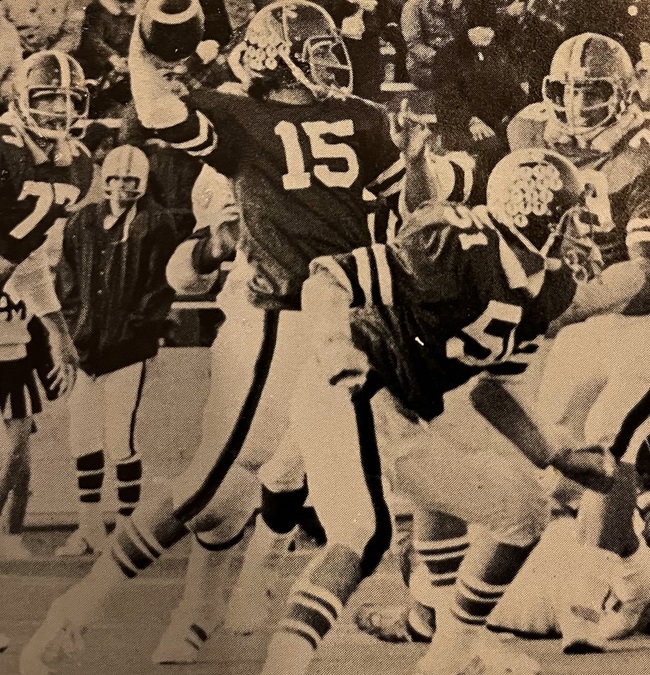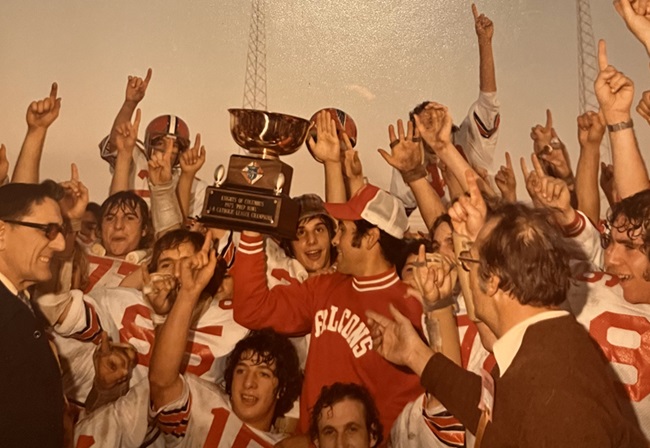
'Wakers' Continue Marching Together
November 5, 2019
By Geoff Kimmerly
Second Half editor
First the local media picked it up, which made sense – it was a great story, and easy to appreciate whether you’ve heard of Maple City or could find Fife Lake on the map.
In what was still perhaps surprising but a logical next step, The Associated Press and then Detroit Free Press and MLive took the story statewide. But then CNN and NPR told the rest of the U.S. – which was followed by interest from The Kelly Clarkson Show and a Skype interview with one of Ellen DeGeneres’ representatives.
There is no way Maple City Glen Lake athletic director Mark Mattson could’ve foreseen any of that publicity as he prepped for his football team’s home game Sept. 27. All he knew was that his high school didn’t have a marching band, and Fife Lake Forest Area – at least this season – didn’t have a varsity football team.
If you pay attention to high school sports in general or statewide news casually, you’ve probably heard some of the rest of this story. Mattson invited Forest Area director Brandon Deike and his band to play at Glen Lake’s game that night against Gladstone. A week later, after their story had been told all over the country, the schools combined for a “Marching for Ellen” spirit video hoping to land on the show.
Things have quieted back down substantially for the two small northern Lower Peninsula communities. But their march together continues.
“We don’t want it to end,” Mattson said. “Sometimes you see these initiatives begin, and it’s really cool, and they fizzle out. We want to work with our kids and their kids and Brandon over there to make cool things happen as we support each other – and at the end of the day to make his program grow and make our program grow over here.”
Glen Lake's athletic director said the Warrior marching band is welcome back anytime.https://t.co/RPXSNueHIx
— upnorthlive.com (@upnorthlive) September 29, 2019
A little background: Forest Area’s high school and Glen Lake’s are 45 miles away, or about an hour’s drive whether traveling through or around Traverse City. Glen Lake has nearly 250 students in its high school, and Forest Area has about 175.
Glen Lake’s football team is 9-1 and hosts Harrison on Friday in a Division 6 District Final. Forest Area started this fall playing 8-player football, and won its first game against Brethren 64-44. But the Warriors had started with a small roster that got smaller as the season got going – and by Week 3 didn’t have enough players to finish the season, so they canceled the rest of their games.
Meanwhile, Forest Area’s band has rebuilt mightily since the school’s music program was cut in 2011 – while Glen Lake’s band began this school year with one high schooler playing with a 10-member middle school group. In fact, Mattson asked his school’s football players and cheerleaders the last time they were at a home game where there was a band – and they couldn’t remember one.
So the Sept. 27 game happens, and all of the feel-good fanfare that came with it. With a few weeks, the statewide and national attention slowed way down – but the relationship between the schools was just beginning to grow.
A week later after the Gladstone game, Glen Lake hosted Elk Rapids on the night that was supposed to be Forest Area Homecoming – so during that school day, a group of Glen Lake football players and cheerleaders went over for Forest Area’s pep assembly, at first to be part of the “Marching for Ellen” video but then sticking around to take part in the Warriors’ festivities.
Then on a Monday night, Oct. 14, Mattson took a group of students to Traverse City to support Forest Area during the area’s band expo at Thirlby Field. There was some hope the schools might unite their forces again for Glen Lake’s final regular-season home game Oct. 25. But although that didn’t completely pan out, Forest Area did sent over 20 members of its band, who sat in bleachers on the track with Glen Lake’s student section, band and choir – and cheered on the now growing Glen Lake band, which included Mattson on the saxophone he’d stopped playing in sixth grade.
“One of the Forest Area kids called over from the bleachers, ‘Mr. Mattson, come here. I think we need to call our schools ‘Wakers,’” Mattson said (with the student referring to a combination of the mascot names Warriors and Lakers). “It really had gone from literally about zero to what we’ve got, and it’s a really collaborative partnership here."
“This isn’t their band director or myself making it happen. This is by and large kid driven. Our kids keep asking, ‘Are they coming for the game Friday night?’ Or their kids talk to Mr. Deike and say, ‘Can they come to our pep assembly?’ They know they’re welcome back to play with us any time.”
Mattson has recently taken over as administrator as well of Glen Lake’s fine arts department, and rebuilding the school’s band is a high priority. Glen Lake has brought in retired Traverse City West band directors Pat Brumbaugh and Flournoy Humphreys as “artists in residence” to revive the program. They’re teaching a two-day-a-week Intro to Band class, and Mattson said there are about 35 fifth and sixth-graders signed up.
Mattson also noted how the Forest Area band has opened up the perspective of his school’s football players, who have gained a real appreciation for all of the groups – cheerleaders and band especially – who join the players on the field in making for a great football night.
“What started from one simple gesture to help a school out and vice versa turned into, and I think Brandon would echo it, turned into valuable lessons for our society about teamwork and collaboration, and that kindness matters,” Mattson said. “When it’s driven by young people and really executed by our young people, how does it get better than that? They’re the next generation of leaders. To take it from simply, ‘Yeah, that sounds cool,’ to go and play at Glen Lake, to what it’s become, it’s a great lesson for all of us. That when these kids take the initiative and make it their own, special things happen – and that has happened.”

'Refuse to Lose' Divine Child Set Tone for Teams to Come with 1st Class B Title
By
Brad Emons
Special for MHSAA.com
November 15, 2024
There was no more conjecture, no newspaper or Associated Press polls to determine the state football champions.
The champion was no longer decided on paper, but out on the field as the MHSAA launched its first playoff tournament in 1975.
Only 16 total teams over four classes were invited to the dance.
And a school with an already a rich football heritage in Dearborn Divine Child proved it on the field with a 21-0 win over Saginaw MacArthur in the Class B title game before 4,000 fans at Central Michigan University’s Perry Shorts Stadium in Mount Pleasant.
In the Semifinals, MacArthur had outlasted Flint Ainsworth, 44-38, as senior halfback Mark Neiderquill rushed for 285 yards and four touchdowns, while Divine Child ousted Sturgis, 20-3.
In the frigid championship final on Nov. 22, the Falcons’ defense held MacArthur’s high-octane offense to seven first downs and 74 yards rushing. They caused three turnovers, with two fumble recoveries and an interception leading to all three of their TDs.
“I thought we could move the ball, but MacArthur was tough,” DC coach Bob LaPointe told the Detroit Free Press.
In the second quarter, Pat Doyle returned an interception 28 yards for a TD, and Mike Surmacz added the PAT for a 7-0 Divine Child advantage.
 “That first interception really got us rolling,” LaPointe said. “Doyle can run the 40 in 4.9 and speed is what made that touchdown. But he got good blocking, too.”
“That first interception really got us rolling,” LaPointe said. “Doyle can run the 40 in 4.9 and speed is what made that touchdown. But he got good blocking, too.”
Two minutes later, Mike Wiacek gave DC another scoring opportunity when he recovered a MacArthur fumble at the Generals’ 24. Nine plays later, senior quarterback Dan Faletti swept right end and scored on a three-yard bootleg for a 14-0 lead.
“The big thing is that they had a good running back that we had to make sure we kept under control,” said Faletti, who went on to play at Eastern Michigan University before a neck injury prematurely ended his career as a sophomore. “We pretty much got the lead, and Bob was conservative. I just remember scoring that touchdown, and my picture made the paper the next day.”
Neither team could move the ball in the third quarter. There were no first downs.
All-stater Mike Svihra then picked up a fumbled lateral in the fourth quarter and ran 10 yards for the game’s final TD.
“It was not a lot of offense; it was a bitter, cold day,” said Faletti, who went on to work for the Department of Defense for 20 years and Ford Motor Co. before recently retiring. “Bob LaPointe ran a conservative offense. We did ball-control, we didn’t put tons of points on the board ... we didn’t fumble the ball. We didn’t throw interceptions.”
The game, ironically, was played on AstroTurf, not on real grass.
“Everyone makes a bit deal of it, but there really isn’t that much difference,” LaPointe added afterwards. “The only thing I regretted about this game was that I could dress only 44 of my 56 players under the rules. It was tough (to) tell the other 12 they couldn’t suit up.”
An 18-12 loss to Madison Heights Bishop Foley during the final regular-season game, spoiling what would have been an undefeated season in 1974, had left the Falcons distraught – but even more galvanized as they made preparations for the 1975 campaign.
The Falcons also changed their offense in 1975, switching to a triple-option attack that LaPointe got from Notre Dame. The offense proved to be good enough for a 9-0 regular season and an MHSAA playoff berth.
“We were an underdog the whole thing, the whole time, we were the underdog in every big game we played in, but we didn’t allow people to beat us,” said Wes Wishart, who coached the linebackers and offensive line that season before taking over the head coaching reins for the Falcons from 1978-95. “We refused to lose, and that was the motto. From ’74 on those group of kids said, ‘We refuse to lose.’ You use that phrase as a coach all the time, but this group of kids lived it. They were the ones that invented it. When things got tight, ‘refuse, refuse, refuse.’ We’re not backing off from anybody. Great group of young men, great players.”
 During the regular season, DC earned victories over highly-touted Flint Powers Catholic (20-14), previously unbeaten Southgate Aquinas (26-12) and Allen Park Cabrini (12-8).
During the regular season, DC earned victories over highly-touted Flint Powers Catholic (20-14), previously unbeaten Southgate Aquinas (26-12) and Allen Park Cabrini (12-8).
That set up a Catholic League Prep Bowl showdown in the final game of the regular season against highly-touted 8-0 Birmingham Brother Rice, which was ranked No. 1 in the final regular-season AP Class A poll.
Although the Falcons were a decided underdog, the AA division champs upended Rice, 7-0, before a packed crowd at Eastern Michigan University’s Rynearson Stadium to snap the Warriors’ 22-game winning streak thanks to Jim Kempinski’s fumble return for a seven-yard touchdown as he snagged the ball in mid-air and never broke stride while crossing into the end zone.
“We played our butts off,” Faletti said. “It was a dog-eat-dog game.”
It was DC’s 11th Catholic League title, but more importantly put the Falcons into the first MHSAA Playoffs against Sturgis in a Semifinal match at C.W. Post Field in Battle Creek.
“I remember everything was brand new; nobody knew what they were doing,” said Wishart, who guided the Falcons to the 1985 Class A crown as their head coach. “Coach LaPointe on Monday had to get the school to get our hotel rooms in Battle Creek.”
Steve Toepper booted a 27-yard field goal for Sturgis to open the scoring, but DC responded with 20 unanswered points.
In the final quarter, DC’s Rick Rogowski scored on a seven-yard run with 9:23 left (after Steve Savini recovered a fumble caused by Joe Wiercioch) followed by a 10-yard TD run by Faletti with only six minutes to go (after Svihra recovered a fumble).
That sent the Falcons into the Final at CMU, where their defense suffocated MacArthur (9-2).
“We kind of ran a special outside zone. We had to quickly change (how) we would defend that. We shut them down,” said Wishart, who spent 50 years in CYO and high school coaching before retiring to live in New York. “There was no doubt, we were more physical than they were. We were blue collar kids. Typical Divine Child kids, hard-working, never give up.
“We believed desperately in defending Divine Child at all costs because we were a smaller school, so we had an attitude that still lingers there today that we all cultivated. We were going to be a physical squad.”
Meanwhile, what made the Falcons special and unique that title season was their “one for all and all for one” attitude.
“Everybody was the same,” Faletti said. “When we went between the lines, we were all equal. As captain, I got to be command as quarterback in the huddle. But off the field we were all equal. We played like 22 seniors. We were ready for this game.”
PHOTOS (Top) Dearborn Divine Child coaches and players receive the Class B championship trophy after winning the inaugural title game in 1975. (Middle) Falcons quarterback Dan Faletti throws a pass during the Final. (Below) Divine Child players and coaches raise their Prep Bowl trophy in celebration. (Championship game photos courtesy of Dearborn Divine Child yearbook. Prep Bowl photo provided by Dan Faletti.)

